If you own an African grey parrot or are thinking of adding one to your family, you might be wondering how long you can expect your partner in crime to stick around. How long do African grey parrots live? Spoiler alert: potentially a very, very long time, but it’s up to you to make sure that actually happens.
Let’s go into African grey parrot lifespan and what you can do to make sure yours lives a very long and happy life.
This post contains affiliate links. If you make a purchase, a small percentage will go directly to Psittacology at no additional cost to you. Thank you for supporting Psittacology!
What is the lifespan of an African grey parrot in the wild?
The genus Psittacus (African grey parrots) once contained a single species (Psittacus erithacus) as well as a subspecies (Psittacus erithacus timneh). Nowadays, the subspecies has been elevated to the status of an actual species: Psittacus timneh, also known as the Timneh African grey parrot.
There are some subtle but noticeable differences between the two African grey species and they don’t occur in the exact same areas in the wild. However, their potential lifespans seem pretty much the same.
Wild African grey parrots can reach impressive ages. As is to be expected, though, a large percentage of them don’t even make it to adulthood. The life of an African grey in its natural habitat can be harsh, with threats from disease as well as raptors and other predators.
According to ADW, the average lifespan of an African grey parrot in the wild is 22.7 years, which is not bad at all considering the dangers they face on a daily basis.
Did you know? Both species of African grey parrot are endangered in the wild due to human activity. They prefer forest habitats in the wild, which are rapidly disappearing. Additionally, the pet trade has absolutely ravaged their numbers. It’s now extremely illegal to trade wild African greys, but obviously it’s almost impossible to completely prevent this.
IUCN Red List, Psittacus erithacus
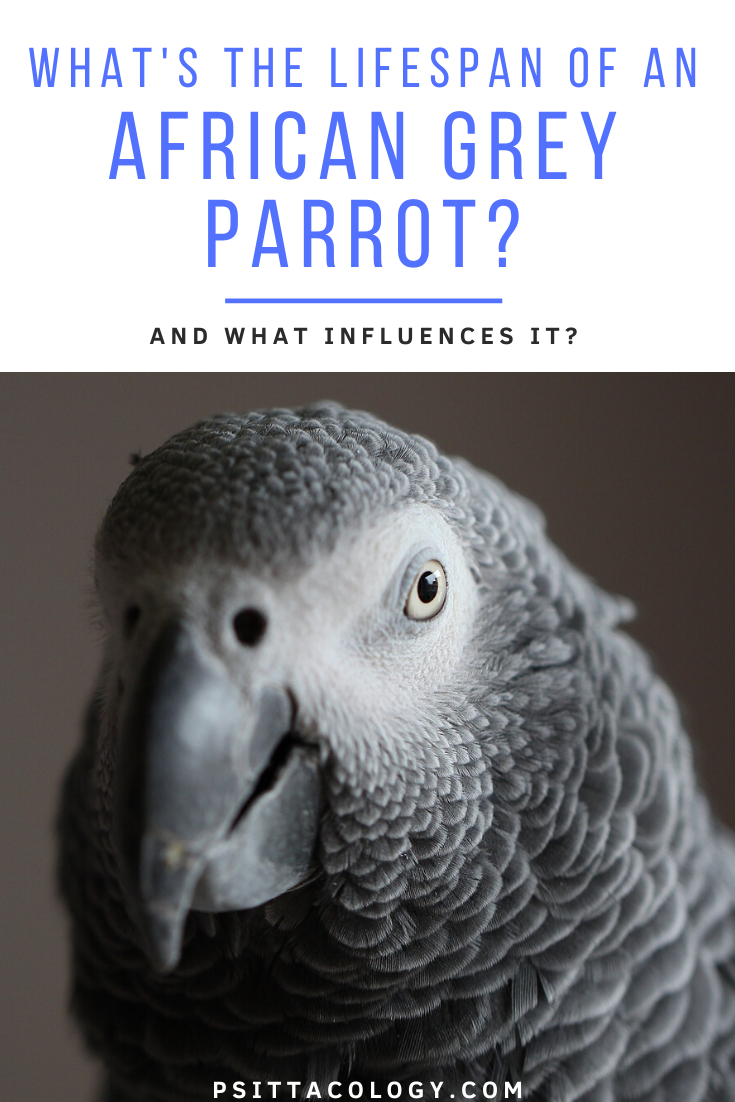
What is the lifespan of an African grey parrot in captivity?
African grey parrots have the potential to live a lot longer in our homes than they do in the wild. Although bad husbandry still leads to huge numbers of African greys passing away prematurely, their average lifespan in captivity is still noted to be around 45 years by the Convention on International Trade in Endangered Species (CITES).
It’s important to keep in mind that this number of 45 years is the average lifespan for the species as pets, not an absolute lifespan. They can live for much longer, with reports floating around of African grey parrots with the documentation to prove that the bird is or was over 80 years old.
Whether or not your African grey parrot will actually make it to a mindboggling eight decades of age probably has a lot to do with luck and genetics, since birds this old are really outliers.
Whether or not your bird makes it to something more realistic like 45 to 60 years old, though, depends almost entirely on YOU. With good care it’s entirely possible for African grey parrots to reach an age like this.
Did you know? The oldest parrot listed in the Guiness Book of World Records was Cookie, a Major Mitchell’s cockatoo who passed away at 82 in 2016. There’s also Poncho the green-winged macaw, who was apparently 91 in 2017.
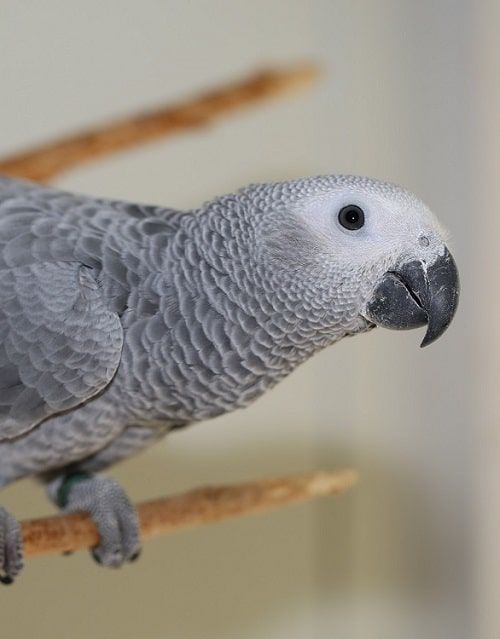
What influences the lifespan of an African grey parrot?
Now that we’ve established that African grey parrots are friends for life, you’re probably wondering what you can do to make sure yours stays with you for years to come. Let me go into serious mode here for a second:
As with all domestic parrots, it’s extremely important to think things through before you make the decision of adopting an African grey. They need just as much care, attention and stimulation as a dog or even a child in some cases, and they depend entirely on you for their health and well-being.
You can’t expect your parrot to thrive if you just stick it in a cage and view it as a decoration piece. To be a good African grey parrot owner, you’ll have to be willing to provide top-notch care and lots of love for a huge chunk of your life!
Now that we’ve got that over with, let’s go into what it actually means, practically speaking. What care factors are important influencers of domestic African grey parrot lifespan?
Diet
Diet is probably the number one influencer of domestic parrot lifespan and unfortunately also the point where things go wrong for most. The problem is that myths about parrot diet are still very prevalent: most people who haven’t done specific research on parrot care still think they can thrive on just seeds.
Wild African grey parrots actually do eat seeds whenever they can find them. However, they are mostly frugivorous, meaning their preference goes out to fruits. That makes sense, as fruits have a high sugar content and therefore provide wild greys with the energy they need! Oil palm fruits are a big favorite (Enciclopaedia Brittanica, 2018).
In the wild, African grey parrots will also feed on pretty much anything else they can find. They supplement their diet with some types of leaves, flowers, tree bark and even any unlucky insect that finds itself in front of their powerful beaks. Additionally, they’ll visit farmer’s fields to feed on their crops.
Did you know? Wild African grey parrots are also known to eat small amounts of clay and dirt, which probably contain important trace nutrients.
So what should you be feeding your African grey parrot in captivity to keep it healthy?
Although it’s true that some of the oldest African greys were fed a diet of mostly seed mix, the chances of yours making it to a respectable age are much greater if you offer a more varied diet consisting of:
- Vegetables: The more colorful the better, and don’t forget leafy greens.
- Fruits: Although wild African grey parrots eat a lot of fruit, they are also much more active than our domestic birds. Offering a variety of fruits is a great idea but don’t give your bird unlimited access, or the sugars might cause it to become overweight.
- A high-quality pellet: These make a great base food for your African grey and contain plenty of (micro)nutrients, vitamins and minerals. Some feed pellets exclusively but it’s better to offer a wide variety of foods.
- A high-quality seed mix: Yes, it’s true that you shouldn’t be overfeeding seeds, as they’re too fatty. No, that doesn’t mean seeds are the devil. You can still offer them as part of a varied diet. Try sprouting seeds as well.
- Extras: (Unsalted) boiled rice, pasta or lentils. Boiled egg. Garden weeds like clover and dandelion leaves. Freshly picked grasses. Bird-safe flowers. A mealworm or two (crush the heads). Be creative and encourage foraging behavior!
- Treats: It’s great to have some on hand for training purposes. Walnut bits, dried fruit or pre-made treats like Nutri-Berries can be offered in small quantities to reward your bird for a job well done.
Tip: Hypocalcaemia (calcium shortage) is particularly common in African grey parrots and can lead to serious symptoms like seizures. Hypocalcaemia is most common in birds that have been fed a seed-only diet (Stanford, 2007), so if you’re following the guidelines above you’re already on the right track. Still, make sure your bird always has cuttlebone and a calcium block available.
Try feeding high-calcium foods like kale and offering foods that block the absorption of calcium, like spinach, only sparingly.
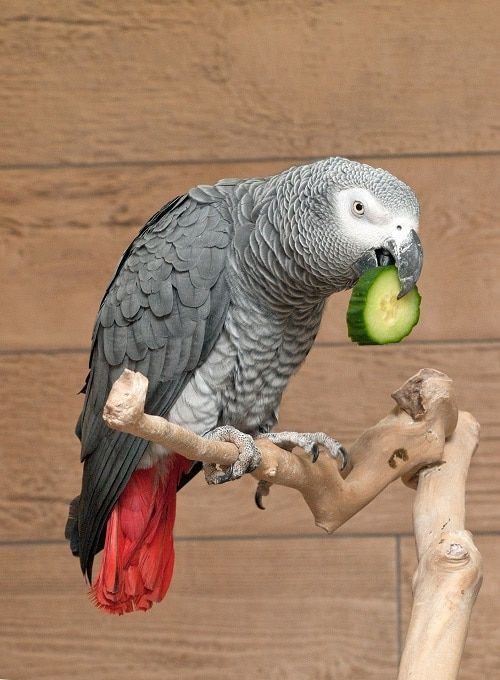
General care
Apart from a proper diet there are a bunch of other factors that affect African grey parrot health and therefore their potential to grow old. The lifespan of an African grey parrot depends, among other things, on the following:
- Exercise. Obesity is a silent killer of domestic parrots because unless you weigh your bird regularly (which you should be doing!), it’s hard to notice under all those feathers.
Your bird should have a big cage and plenty of out-of-cage time to move around. It should be encouraged to forage for its food, and it should have lots of parrot toys to keep itself busy with.
- Air quality. Ever heard of the ‘canary in a mine’? Birds succumb to bad air quality way before we do. It’s logical that we shouldn’t be smoking around our parrots, but did you know they’re also highly intolerant to perfumes and other aerosolized cosmetics (hairspray, deodorant), candles and wax burners, cleaning products, teflon pan fumes and much more?
- Stress. You’ve probably heard that stress is bad for humans’ health. It’s the same for birds! The biggest source of stress for African grey parrots is being alone, as they’re extremely social beings. This stress can manifest itself in feather plucking and other long-term issues.
Dedicate lots of time to socializing with your bird and avoid exposing it to rough handling, being spooked, feeling threatened by predators like cats and other stressors.
- Bird safety. A good parrot owner always has potential accidents in the back of their mind. Can my parrot get its foot stuck in that toy? Can it chew through that cable? Did I close the windows before letting it out of its cage, and did I put the cat or dog in another room so it can’t get to my bird?
- Emergencies. Even if we’re always mindful of possible dangers, a highly curious animal like an African grey parrot can still manage to get itself into a sticky situation. Do you have a blood clotting agent at hand? Do you know what to do when your bird has a splinter lodged in its beak? Do you have the number for an avian vet on hand?
Read up on parrot emergency care and put together a little first aid box. It could save your bird’s life one day.
- Check-ups. Speaking of that avian vet, take your African grey parrot into their office once a year for a health check-up.
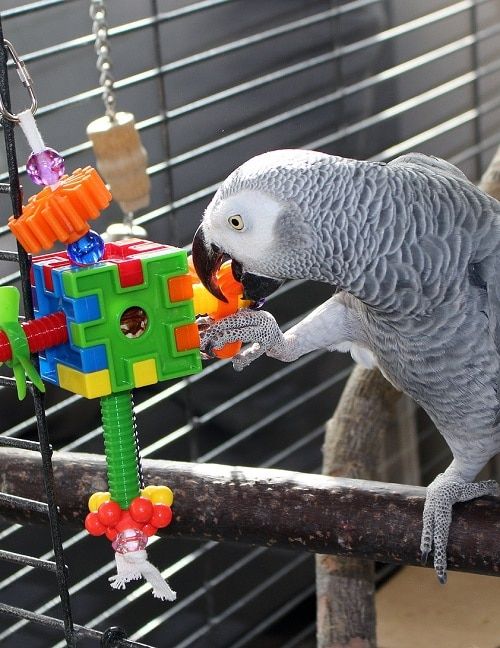
How old is my African grey parrot?
If you already own an African grey parrot, you might be wondering how old it actually is after reading all this. The bad news: as with other parrot species, it’s not really possible to tell the age of a mature African gray parrot by looking at it.
However, there are a few things that might just help you out:
- If your parrot is ringed, then you’re in luck, as rings usually list the hatch date. Even if there’s no ring, if you know who bred your African grey, you can shoot them a message and see if they keep records that might help you figure things out.
- If you haven’t had your African grey parrot for very long yet and it might be quite young, take a peek at its eyes. They won’t give you a precise indication of the bird’s age at all but they can at least help narrow things down slightly.
- Juvenile African grey parrots will have dark irises rather than the normal light yellow coloration. If the eyes are almost black (like the birds in the video below), that means the bird is probably under a year. After this, they will go from brown to a dark yellow all the way to the very light irises that a bird of 4-5 years or up has.
- Still no idea? Ask your vet. They might be able to narrow things down at least somewhat for you, possibly performing a blood test to see if your bird has reached sexual maturity yet (which happens between 3-6 years of age) or has already passed it.
If you have any more questions about African grey parrot lifespan or if you want to share your own experiences with this amazingly intelligent species, don’t hesitate to leave a comment below!
If you’re wondering about the lifespan of other common pet parrots, have a look at the Parrot Lifespan category.

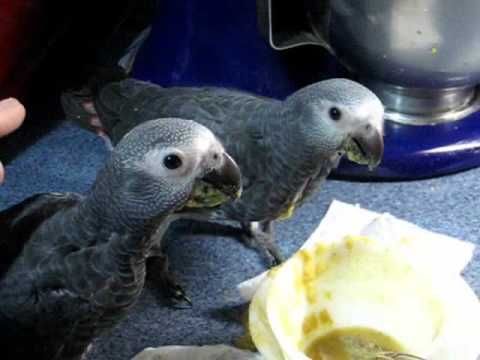
Great article – keep up the good work! Variety in the diet is certainly the key to keeping these chaps happy and healthy, with plenty of fresh foods rich in calcium and vitamins A and D3. Any potential owners should also know that greys give off a great deal of feather dust, even if they are healthy…Don’t buy one unless you are prepared for the equivalent of a feathered toddler!
Haha, very good point! I think an air filter for the house, or at least the room the bird is in, is definitely a good idea. Same even goes for small birds like cockatiels. Dander mayhem!
May African grey get like a fit then the left side wing and the leg is completely dum It take about 15 min then he can use his foot and wing again He can not stand on his foot as this happen what will be the reason for this
I have no idea, I’m not here to give medical advice and it sounds like your bird urgently needs to be taken to an avian vet! I see you’re using a South African email address – this might be a good place to start if you haven’t found an avian vet yet.
Good luck! Please take your grey ASAP.
Our African grey is nearly 24 six months younger than our oldest grand daughter, all our family adore him, longest word is Elizabeth and and will hold a telephone conversation with himself after he has performed the ring tone (all tone perfect) before hanging up
That sounds hilarious, thanks for sharing! I wish you many more happy years together. 🙂
I have a African Grey with ring but no paperwork. Is it possible to obtain paperwork.
If you have the ring, you may be able to use it to track down the breeder, who may have paperwork for the bird. The ring may also contain additional information. I’d do some Googling to see what information yours has! Good luck 🙂
Hi i have had an african grey for 25 years we got her from a dog food warehouse where she sat in a cage to small. She has only one full toe we adore her she is currently under avian vet with apparent sinus prob i took her to vet because she had a slight swelling under her eye. otherwise she seems fine. thank you for all your info.
Thanks for sharing, I’m keeping my fingers crossed for a quick recovery. As you’ve hopefully concluded from this article, you’ll likely be able to enjoy having her around for many more years 🙂
I had my African grey Jodie from an older couple who thought it was best for her to go. The couple’s daughter use to breed them. They had four boys and they tormented her a little so she doesn’t like men much. She loves music and her favorite is a bit random billy ocean love really hurts without you and dances to it. She does say a few Spanish words aswell as speaking English.
Thanks for sharing! Sounds like a fun gal to have around 🙂
Hi, my African Grey is 21 years old. I’ve had him since a baby. I finished him out hand feeding. He has quite the vocabulary and torments my yorkie. What toys do you recommend that will keep his interest that he can’t destroy in five minutes. The toys aren’t cheap. I am the only one that can handle him.
Hey! Sorry about the reply (I was on holiday!) and sorry you’re having trouble finding toys. Where are you located? My friends over at Parrot Essentials (not sponsored, I just work with them) have an African grey parrot toy section, and while some toys are obviously made to be shredded to bits quickly, some should definitely be sturdier. The shop owner has loads of experience with greys and I think currently owns at least one.
You could also consider buying parrot toy making parts to create your own, since it’s cheaper and you can construct them in such a way that they work for your grey. Hope that helps! Good luck.
I’m not sure how much longer I can tolerate the incessant fire alarm battery vocalizing both my timnehs engage in. I gave no idea where the one got it, but the other quickly picked it up. It’s been going on for most of the 20 years they’ve lived with me, and I am at the point of considering rehoming. Although fear for their safety somewhere else has kept my impulse to rid myself of them in check, I am close to not caring anymore. I just want to never hear that sound again…and I will…tomorrow…all day…and the next day…and the day after that…
I have no funny cute endearing stories to tell…just the hell of being subject to a sound made by birds that are supposed to be as intelligent as a 9-year old child…a behavior that infuriates me beyond anything else these birds do because it feels deliberate because they are so intelligent. I dread uncovering them in the morning and can’t wait to cover them in the evening. I wear earplugs most all day just to minimize the ear-piercing volume, but I work from home and am on the phone all day so I can’t realistically wear earplugs all day every day. I’m certain they have contributed to my developing tinnitus.
Knowing they can live another two to five decades makes me truly wish I could go back to the year 2000 and stop myself from ever looking on Craigslist and finding them. Had I known then…
I can’t find a solution. I believe the situation is hopeless.
Oh man! I’m sorry you’ve been going through this for such a long time. It’s amazing you’ve stuck it out this long, you’re clearly dedicated to their well-being despite the constant noise. Have you contacted with a parrot training expert, ie. a parrot behavior consultant? It sounds like the kind of thing they might know how to deal with. I suppose it can be pricey, but they may be able to provide certain cheaper resources if you’re on a tight budget. I’m going to check in with an acquaintance who does parrot training, so keep an eye on this comment thread in case he has anything to add.
If possible, could you share any techniques you’ve already tried in order to deal with the behavior?
OK, you could contact with email address admin (at) hotelpolly (dot) co (dot) uk. It’s a paid service, but he says he’s actually gone through something similar with an African grey as the result of a low fire alarm battery. May be worth a shot for your sanity. Good luck!
I’ve had my African Grey since she was a baby. She’s now 31 years old. She picks up all kinds of sounds and words. She’ll latch onto a particular word or sound and it will be her favorite for a few weeks or months and then she’ll move on to something else. I’ve lived with her longer than with my children, my husband, and any other living creature. I’m now in my 60’s and wondering how to provide for her in the event she outlives me.
Thanks for sharing! That’s fantastic and she sounds like a great bird. About your comment on her outliving you – many parrot owners do include their birds in their wills. It indicates things like who you want her to go to, and allows you to allocate some funds for her care. Something that may be worth looking into if you’re worried! Good luck 🙂
Have a 34 year old African grey, finished hand feeding her since 4 months old. Every dog we’ve had has learned to respect her. Even when she deliberately annoys them, they may woof or snap towards her, but none of them have ever touched her, just give her and us warnings to get her away from them.
She’s fallen in love with everyone in the family over the years and they the same over time. Any of the family can pick her up and cuddle her (on her terms, of course!)
For years my daughter grew up knowing Misty would live with her when I could no longer keep her. But Misty and my son finally established a bond after he rescued her when she flew away outside. Her hero!! So I know either one of them will love and care for her or share her on occasion. My only concern is that I have no grandchildren so I am hoping Misty doesn’t outlive both of them. Looking at your article it seems likely she won’t as 42-60 years seems to be the general longevity of family greys.
We all love her and she is. I’m so glad I had the opportunity to bring her into our lives so many years ago as a baby. Just know that they are a lifetime commitment (or should be) and need as much care and love as children.
I’m not sure if I have properly signed up to receive further information from you or not. If I didn’t successfully do so, please sign me up.
Thanks!
Thank you for sharing 🙂 I love reading these stories from readers. Wish you and your family many more happy years with Misty.